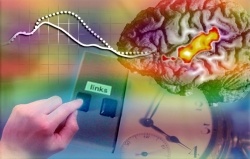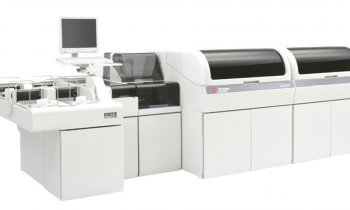Developing new biomarkers for Alzheimer's disease diagnosis
Latest estimates predict that the global prevalence of Alzheimer's disease will quadruple by 2050. The EU funded research project "PredictAD" aimed at developing new diagnostic tools by combining data from imaging biomarkers, electrical brain activity measurement and blood based markers.

The number of persons, who will suffer from Alzheimer's disease will increase. "According to the latest estimates, the global prevalence of ist is predicted to quadruple to 106 million by 2050", says Dr. Lennart Thurfjell, Head of Diagnostic Software, Medical Diagnostics at General Electric (GE) Healthcare. And even worse: To date there is no single test or biomarker that can predict whether a particular person will develop the affliction. A definitive diagnosis is only possible after death. "Thus, there is a critical need for effective diagnostic tools to help in the early diagnosis of this debilitating disease", Thurfjell adds.
The European Union (EU) is aware of the situation. Therefore the EU funded the PredictAD project. Coordinated by the VVT Technology Research Centre of Finland, GE Healthcare and a consortium of leading research institutions across Europe the group will study different parameters of the patients in depth and consolidate this data.
"The aim of PredictAD project is to develop an objective indicator to diagnose Alzheimer's disease at the earliest stage. This may be possible by combining data from various sources of patient monitoring, such as neuropsychological tests, medical imaging, electrical brain measurements and analyzing protein and metabolomics levels of blood samples", says the Scientific Coordinator of the project, Dr. Jyrki Lötjönen from VTT. Early diagnosis, he adds, may play an important role in effective medical treatment of Alzheimer's disease, especially in the future, as the next generation of more effective therapies become available for all patients.
At a later stage during this three-year project, a selected biomarker set will be used to develop an efficient and reliable software solution that can be used by a physician to assess the risk, to diagnose and to monitor the progress of Alzheimer's disease in real clinical conditions using various patient data. The accuracy, usability and cost-effectiveness of the models and software will be clinically evaluated.
Currently, there is no curative treatment for Alzheimer's disease. If new drugs or prevention strategies were proven to be effective, an early diagnosis may enable doctors to provide medical care at an earlier stage, at a time when clinical diagnosis using only signs and symptoms of disease is challenging.
"PredictAD fits perfectly with GE Healthcare's "Early Health" vision as it will help us gain important knowledge, not only about individual biomarkers, but also about how they may combine for early detection and therapy response monitoring. Improving our understanding of the role that different imaging and non-imaging biomarkers play during the disease process is key as we strive to develop new diagnostic solutions for Alzheimer's disease," Dr. Thurfjell sums up.
Dementia causes long and oppressive suffering to patients and their relatives, and imposes enormous costs on society. Affecting more than 5 million people in Europe, Alzheimer's disease is the most common cause of dementia; it covers 50-70 % of all dementia cases. Estimated costs of dementia to European society are more than 55 billion € per annum3. As the proportion of elderly people of population is increasing these costs are becoming a real burden to the society. Therefore a major breakthrough in Alzheimer's disease prevention and treatment is vital also in the economical sense.
With a consortium of top-level European research and industrial partners, the PredictAD project takes an important step towards an early approach to Alzheimer's disease prediction and management. Public and private partners from 8 research, academic, industrial and medical organizations from four different European countries will form the research consortium. PredictAD consortium members are VTT Technical Research Centre of Finland, GE Healthcare (UK), Nextim Ltd. (Finland), University of Kuopio (Finland), Imperial College London (UK), Uppsala University (Sweden), University of Milan (Italy) and Rigshospitalet (Denmark).
About VTT Technical Research Centre of Finland
VTT Technical Research Centre of Finland is a contract research organisation involved in many international assignments. With its more than 2800 employees, VTT provides a wide range of technology and applied research services for its clients, private companies, institutions and the public sector. VTT is striving to improve the well-being of society and to enhance the technical and economic performance of its clients.
18.06.2008











